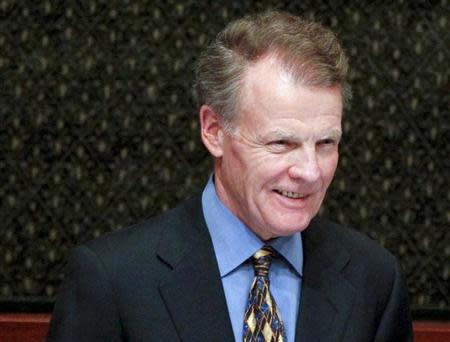Illinois union leaders bash pension plan as details emerge

By Tom Polansek CHICAGO (Reuters) - Illinois union leaders on Friday criticized the details of a controversial deal to reform the state's woefully under-funded public pensions, as legislative leaders revealed more specifics of the deal they reached on Wednesday. The agreement contains proposals to raise the retirement age and reduce automatic increases in pension payments, according to an overview of the bill released by the office of powerful Illinois House Speaker Michael Madigan. Union opponents of the plan say it is little changed from a Madigan-backed proposal that was overwhelmingly defeated by the Illinois Senate earlier this year. "It's a bad rerun of a movie that we saw months ago and for public servants and retirees, it's a horror film," said Anders Lindall, spokesman for the American Federation of State, County and Municipal Employees (AFSCME). Under the deal, the retirement age for workers who are currently aged 45 and under would gradually increase. And for high wage earners, the state would set a cap on the portion of their salaries used to calculate pension benefits, according to the overview issued by Madigan's office. The current 3 percent annual cost-of-living adjustment (COLA) for retirement pay, which is compounded annually, would be subjected to a formula aimed at benefiting longer-term, lower-earning workers. Increases would be tied to the inflation rate. At the outset, cost-of-living increases would be suspended for anywhere from one to five years, depending on the age of the worker. AFSCME's Lindall said the cuts to the COLA would reduce the total value of a typical retiree's pension payments by some 30 percent over 25 years of retirement. Union leaders had questions about some aspects of the deal, including a provision to prohibit collective bargaining on most "pension matters." In the only pension-related issue that still could be resolved during talks, teachers can continue to negotiate with school districts to make contributions to their pensions in lieu of salary increases. It was unclear exactly which "pension matters" would be included under the ban, said Dan Montgomery, president of the Illinois Federation of Teachers. "It's a sweeping, unnecessary, crude attack on public workers," he said about the plan. The Illinois Senate and House are expected to take up pension reform next week. (Editing by Chizu Nomiyama)

